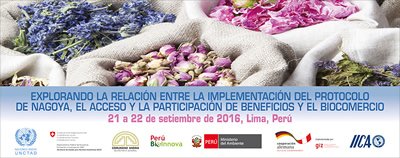With exports close to 900 USD million in 2014, the Andean region is leading word exports of Biodiversity-based products and services. In this region, BioTrade has also been the main factor for benefit sharing arising from the utilization of biodiversity, generating sustainable management of about 300'000 hectares of land, creating more than 30'000 jobs, and educating more than 1'300 functionaries and practitioners.
According to Walker San Miguel, Secretary General of the CAN, organizing this event with UNCTAD is a laudable effort for the region. "Biodiversity is a key asset for Andean countries as it has allowed a trade 'boom' of previously unknown species such as Aguaymanto or Sacha inchi in Peru, domestic varieties of organic cocoa and coffee in Colombia, and Quinua in Bolivia", he emphasized.
With the entry into force of the Nagoya Protocol, all R&D and product development activities based on genetic resources and biochemicals will be subject to access and benefit sharing (ABS) requirements.
The Andean region is one of the few in the world that has a regional ABS regime: Andean Decision 391. So far in the region only Peru has ratified the Protocol, while Colombia and Ecuador still are discussing internally their ratification process.
Jose Alvarez, Director General of Biological Diversity, Ministry of Environment of Peru (MINAM), mentioned that the implementation of the Protocol in a mutually supportive manner with BioTrade can make a significant contribution to biodiversity conservation, sustainable use, trade growth and poverty reduction.

- Explorando la relación entre la implementación del Protocolo de Nagoya, el Acceso y Participación de Beneficios y el BioComercio (21-22 September 2016)
- Debemos valorar que tenemos un continente de paz para Walker San Miguel, Secretario general de la Comunidad Andina
- Biocomercio en la región andina para Walker San Miguel, La Razón (Edición Impresa)
- Se incrementan las cifras de BioComercio en los países andinos, según UNCTAD
- Explorando la relación entre la implementación del Protocolo de Nagoya, el Acceso y Distribución de Beneficios y el BioComercio
- UNCTAD: “Se incrementan las cifras de BioComercio en los países andinos”
The workshop allowed discussion of policy and legal options for promoting a BioTrade friendly implementation of ABS regulations in light of the Nagoya Protocol, such as introducing electronic application systems, establishing single window and prior ruling schemes; avoiding burdensome processes; considering benefits under BioTrade as benefit sharing under ABS regulations and making use of the Convention of Biological Diversity (CBD) ABS clearing house mechanism. The Andean countries will be revising Decision 391, and Peru will do the same with the national ABS regulations so they can better respond to new challenges and opportunities.
During the event, experiences by BioTrade companies on ABS application and negotiations were presented by Bioprocol (Colombia), Cosmo (Peru) and Natura (Brazil). According to German Schafer, CEO of Bioprocol, "the Andean region and the Amazon basin are becoming the Silicon Valley of natural ingredients and products for the cosmetic, food and phytopharmaceutical companies".
Martin Peter, Director of Swiss Cooperation in Peru (SECO), while praising the joint initiative as a unique undertaken for policy convergance, underlined that UNCTAD research on "Facilitating BioTrade in a challenging Access and Benefit Sharing Environment" http://unctad.org/system/files/official-document/webditcted2016d4_en.pdf provides clear policy guidance for implementation of the Nagoya Protocol as well as a significant compilation of case studies and best practices for regulators and businesses".
The workshop was mostly directed towards Peruvian stakeholders and it was attended by more than 60 policy makers, private sector companies, as well as academia and civil society representatives. Additionally, about 95 more people located in research centers from all over the region participated via IICA's video streaming.
The event also gathered experts from the Secretariat of UNCTAD, the SCBD, SGCAN, MINAM-Peru, MINCETUR-Peru, SPDA, ProAmbiente, Peru BioInnova, INDECOPI and several Universities.
All participants reiterated the value and uniqueness of UNCTAD's intervention on the interphase between the Nagoya Protocol implementation, and requested further support on ABS and BioTrade contract drafting and negotiation.
This event is part of the BioTrade Facilitation Programme III, made possiblée with support of SECO.


